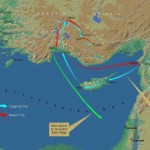Motivated to missions because of duty, expectations, or something else
Felicity at “Simply Church” has written another good (and short) post called “Motivated for mission.”
She begins with what Matthew records as Jesus’ final exhortation to his followers in Matthew 28:19-20. Jesus told them to “Go and make disciples…”
In response, Felicity makes the following statement:
We can follow his instructions out of duty, obedience, or even the expectations of others.
I thought about this statement a couple of days ago when I heard some students discussing a recent sermon delivered in chapel. One of the students said, “If so-and-so’s sermon doesn’t convince you to go overseas, then nothing will.”
Now, I’m sure the student’s statement was hyperbole, and he doesn’t really believe exactly what he said.
But, it did cause me to think about motivation, especially motivation to “go and make disciples.”
What do you think? Are duty, obedience, or the expectations of others the proper reasons for following Jesus’ instructions (either the great commission or anything else)? If not, then what is the right motivation? How do we help motivate people, or do we?
Paul Celebrates the Lord’s Supper with Pagan Soldiers?
When you read commentaries, articles, essays, or blog posts concerning the Lord’s Supper / Communion / the Eucharist, you’ll find reference to terms like “give thanks” and “break bread.” Often, these terms are treated like technical terms that refer to the Lord’s Supper.
For example, many will point to Jesus’ last supper with his disciples before his crucifixion (in Matthew 26:26-28, Mark 14:22-24, and Luke 22:14-20) as a prefiguring of the Lord’s Supper. In these passages, we find phrases like “took break,” “blessed [the bread],” “broke [the bread],” and “gave [the bread] to his disciples.” Then, when the terms are found later in Scripture (in Acts, for example), then the author must be talking about the Lord’s Supper.
Thus, many point to Acts 2:42 as indicating that the early church partook of the Lord’s Supper when Luke writes:
And they devoted themselves to the apostles’ teaching and fellowship, to the breaking of bread and the prayers. (Acts 2:42 ESV)
Similarly, some say that Paul and those traveling with him shared the Lord’s Supper with the church in Troas:
On the first day of the week, when we were gathered together to break bread, Paul talked with them, intending to depart on the next day, and he prolonged his speech until midnight. (Acts 20:7 ESV)
But, there is a very interesting passage at the end of Acts that we should consider as well. This account takes place in the middle of a storm on a ship in the Mediterranean Sea. Luke writes:
As day was about to dawn, Paul urged them all to take some food, saying, “Today is the fourteenth day that you have continued in suspense and without food, having taken nothing. Therefore I urge you to take some food. It will give you strength, for not a hair is to perish from the head of any of you.” And when he had said these things, he took bread, and giving thanks to God in the presence of all he broke it and began to eat. Then they all were encouraged and ate some food themselves. (Acts 27:33-36 ESV)
Luke had told us a few sentences earlier that Paul was talking with the Roman centurion and soldiers (Acts 27:31), but it’s not hard to assume that he was talking with his own traveling companions and the sailors as well.
Notice that this account includes much of the technical language that we saw associated with the Last Supper (and the Lord’s Supper) previously: “took bread,” “gave thanks [for the bread],” and “broke [the bread].” And, yes, the term translated “gave thanks” is the same term from which we get the word “Eucharist.”
So, many argue about whether or not this represents the Lord’s Supper. Some suggest that it is, since the various technical phrases are used. Others suggest that it is not, since Paul shares it with pagan soldiers and sailors.
But, would Paul understand the problem like we do? Would he be concerned with whether or not he was “partaking in the Lord’s Supper”?
Instead, what if these technical terms simply mean that Jesus and Paul shared a meal with those around them? And, what if these same terms in other places in the New Testament simply pointed to a shared meal? (For example, see Acts 2:42, Acts 2:46, Acts 20:7, Acts 20:11, 1 Corinthians 10:16-17, 1 Corinthians 11:26-28)
If these words are technical terms that point to a special ordinance/sacrament/ritual and not to a common meal, then how do we explain what Paul was doing in Acts 27?
Who is your spiritual covering?
Recently, someone (and I don’t remember who) asked me if I had ever written anything about the concept of church leaders (especially the senior/head pastor) being a “spiritual covering”. (If you asked me that, let me know, so I can give credit where it is due.)
My answer was that I had not written about that topic, but perhaps I should. But, where should I start?
This is a huge question, and it reaches down into the depths of our understanding of God, Jesus Christ, the Holy Spirit, and the church. For example, in the way that I understand God and the church, the concept of a “spiritual covering” doesn’t make sense. So, when I read Scripture, it’s hard for me to see any suggestions that one person acts as a “spiritual covering” for another person.
So, I’m throwing this question out to you. Whether you agree with the concept of a “spiritual covering” or not, what arguments or Scripture have you heard/seen to support a “spiritual covering”?
The Gospel and the Word and the Scriptures
Often, Christians use the phrases “Word of God” or “Word of Christ” or “Word of Truth” or simply “Word” to refer to the Scriptures (i.e., the Bible). However, it’s clear that in the Scriptures themselves, these phrases often do not refer to the Scriptures (even earlier versions of the Scriptures, such as what we now call the Old Testament).
For example, almost everyone agrees that the term “Word” in John 1 (i.e., John 1:1 and John 1:14) does not refer to the Scriptures, but instead refers to Jesus Christ. The term “Word” probably refers to Jesus Christ in Hebrews 4:12 also.
Besides these examples, there are other occurrences of the term “Word” that seem to refer to the gospel, or, the good news. Some of these references are straightforward. For example, consider these passage:
In him you also, when you heard the word of truth, the gospel of your salvation, and believed in him, were sealed with the promised Holy Spirit… (Ephesians 1:13 ESV)
In that passage, it’s clear that “word of truth” refers to “the gospel.” In the same way, consider a similar statement that Paul makes to the church in Colossae:
… because of the hope laid up for you in heaven. Of this you have heard before in the word of the truth, the gospel, which has come to you, as indeed in the whole world it is bearing fruit and growing – as it also does among you, since the day you heard it and understood the grace of God in truth… (Colossians 1:5-6 ESV)
It’s possible, however, that once Paul has stated that “word of truth” refers to the gospel, he then uses variations on that phrase to refer to the gospel also. Consider these within the letter to the Colossians:
Now I rejoice in my sufferings for your sake, and in my flesh I am filling up what is lacking in Christ’s afflictions for the sake of his body, that is, the church, of which I became a minister according to the stewardship from God that was given to me for you, to make the word of God fully known… (Colossians 1:24-25 ESV)
Let the word of Christ dwell in you richly, teaching and admonishing one another in all wisdom, singing psalms and hymns and spiritual songs, with thankfulness in your hearts to God. (Colossians 3:16 ESV)
At the same time, pray also for us, that God may open to us a door for the word, to declare the mystery of Christ, on account of which I am in prison – that I may make it clear, which is how I ought to speak. (Colossians 4:3-4 ESV)
In each of these cases, it is possible (and I would suggest probable) that the phrases “word of God,” “word of Christ,” or even just “word” refer to the gospel, not to the Scriptures. Paul set up this reference in Colossians 1:5 (see above).
In two other passages of Scripture, the phrase “word of truth” in used in a way that seems to refer to the gospel:
Do your best to present yourself to God as one approved, a worker who has no need to be ashamed, rightly handling the word of truth. (2 Timothy 2:15 ESV)
Of his own will he brought us forth by the word of truth, that we should be a kind of firstfruits of his creation. (James 1:18 ESV)
While there is not room in this post to completely argue why I think all of these uses of the term “word” refer to gospel, I think it’s clear from the text itself that the referent of “word” is “gospel” in at least some of the passages above.
So, this brings me to the point and questions of this post. In Scripture, we’ve seen that the term “word” can refer to Jesus Christ and to the gospel. However, today, it is often assumed that the term “word” refers to “the Scriptures” or “the Bible.” Is this valid or dangerous? Why?
How do you view leadership among the church?
I occasionally write about leadership among the church. While I usually write about other topics, for some reason the leadership posts seem to garner the most attention. Why? Well, because among believers today, much of church life is centered around those who we recognize as our leaders.
If you’ve read any of my posts about leaders among the church, then you know that I don’t hold to modern concepts of leadership in the context of the church, not even to the concept of “servant-leader.” Why? Because I think Jesus redefined what it means to lead among the church.
Keith at “subversive1” seems to have a similar understanding according to his post “This is What Leadership Looks Like According to Jesus.”
The post consists of 4 pictures: 2 pictures that Keith describes as “leadership according to Jesus” and 2 pictures that Keith says represent leadership among the church today, but that is not leading according to Jesus.
I’d love to hear your thoughts on Keith’s post (pictures).
What do you think about when you hear the word “fellowship”?
Lately, for various reasons, I’ve been thinking about the word and concept of “fellowship.” As I’ve thought about this word, and the various passages of Scripture that use the Greek term translated “fellowship,” I’ve recognized that there’s much, much more to this term than I’ve previously thought.
So, I’ll start this post by asking you this question: “What do you think about when you hear the word ‘fellowship’?”
Seriously, think about it for moment, and try to answer the question for yourself.
Most Christians (even those who do not know Greek) know that “fellowship” is one of the translations of the Greek term κοινωνία (koinonia). However, many do not know how that Greek term is used in Scripture. In fact, the word is only used 19 times in the New Testament, and scanning those usages might be beneficial:
And they devoted themselves to the apostles’ teaching and fellowship, to the breaking of bread and the prayers. (Acts 2:42 ESV)
For Macedonia and Achaia have been pleased to make some contribution [fellowship] for the poor among the saints at Jerusalem. (Romans 15:26 ESV)
God is faithful, by whom you were called into the fellowship of his Son, Jesus Christ our Lord. (1 Corinthians 1:9 ESV)
The cup of blessing that we bless, is it not a participation [fellowship] in the blood of Christ? The bread that we break, is it not a participation [fellowship] in the body of Christ? (1 Corinthians 10:16 ESV)
Do not be unequally yoked with unbelievers. For what partnership [different term but perhaps synonymous?] has righteousness with lawlessness? Or what fellowship has light with darkness? (2 Corinthians 6:14 ESV)
For they gave according to their means, as I can testify, and beyond their means, of their own free will, begging us earnestly for the favor of taking part [fellowship] in the relief of the saints… (2 Corinthians 8:3-4 ESV)
By their approval of this service, they will glorify God because of your submission flowing from your confession of the gospel of Christ, and the generosity of your contribution [fellowship] for them and for all others… (2 Corinthians 9:13 ESV)
The grace of the Lord Jesus Christ and the love of God and the fellowship of the Holy Spirit be with you all. (2 Corinthians 13:13 ESV)
… and when James and Cephas and John, who seemed to be pillars, perceived the grace that was given to me, they gave the right hand of fellowship to Barnabas and me, that we should go to the Gentiles and they to the circumcised. (Galatians 2:9 ESV)
I thank my God in all my remembrance of you, always in every prayer of mine for you all making my prayer with joy, because of your partnership [fellowship] in the gospel from the first day until now. (Philippians 1:3-5 ESV)
So if there is any encouragement in Christ, any comfort from love, any participation [fellowship] in the Spirit, any affection and sympathy, complete my joy by being of the same mind, having the same love, being in full accord and of one mind. (Philippians 2:1-2 ESV)
…that I may know him and the power of his resurrection, and may share [fellowship] his sufferings, becoming like him in his death… (Philippians 3:10 ESV)
… and I pray that the sharing [fellowship] of your faith may become effective for the full knowledge of every good thing that is in us for the sake of Christ. (Philemon 6 ESV)
Do not neglect to do good and to share [fellowship] what you have, for such sacrifices are pleasing to God. (Hebrews 13:16 ESV)
… that which we have seen and heard we proclaim also to you, so that you too may have fellowship with us; and indeed our fellowship is with the Father and with his Son Jesus Christ. (1 John 1:3 ESV)
If we say we have fellowship with him while we walk in darkness, we lie and do not practice the truth. But if we walk in the light, as he is in the light, we have fellowship with one another, and the blood of Jesus his Son cleanses us from all sin. (1 John 1:6-7 ESV)
Obviously, most terms do not have a single meaning, but instead have a range of meanings. Likewise, the Greek term κοινωνία (koinonia) has a range of meanings, but it seems clear from the passages above that the meanings of the term relate to the English terms “sharing” or “partnership.”
In the passages above, the children of God share in Christ, they share finances/goods with one another, they share in the gospel (but not meaning as we say “share the gospel”), they share in their faith (trust) in God, they share in sufferings… and beyond this, they were devoting themselves to (persisting in or continuing in) this kind of sharing.
In other words, they were sharing life… life in Christ and life in one another.
Now, I’d love to hear your thoughts on the term “fellowship.” And, I’d love to hear your answer to this question: What real life example(s) do you have of the kind of “fellowship” that is exemplified in the Scripture passages above?
Do you ever wonder how you can serve your co-workers?
I read and write alot about being “missional,” which to me means living out the gospel every day in every situation with whoever God brings into my life through the power of the Holy Spirit.
But, sometimes, I get stuck. I know what I want to do, but – like Paul – I often don’t do it. So, when I read a post that is helpful in reminding me how to serve people, I like to share it.
Bill at “Provocative Church” has written one such post called “30 Simple Ways to to be Missional in Your Workplace.”
Actually, the post includes a list of 15 items that Bill found on another site. But, he also gives a link to the full list of 30 items. Here are a few:
1. Instead of eating lunch alone, intentionally eat with other co-workers and learn their story.
3. Make it a daily priority to speak or write encouragement when someone does good work.
7. Have your missional community/small group bring lunch to your workplace once a month.
15. Start a regular lunch out with co-workers (don’t be selective on the invites).
I love these kinds of lists. They are not groundbreaking, and, for many, they are obvious. But, for people who do not have a good model of serving others, this kind of thing can be very helpful.
Of course, the point of all of these items is to build relationships with the people we work with… relationships beyond the typical work experience.
Guest Blogger: Who are we? Seeking God together without a formula.
I’ve invited several people to write “guest blog posts” for this blog. There are several reasons for this: 1) To offer different perspectives. 2) To generate even more discussion and conversation between blogs. 3) To introduce other bloggers to my readers.
(If you are interested in writing a guest blog post, please contact me at aknox[at]sebts[dot]com.)
Today’s post was written by JRo. You can follow JRo on Twitter (@JRo1919) and his website.
————————————-
Seeking God together without a formula
When Alan asked me to write to you guys and tell you about the group I meet with I wondered exactly what I was going to say. I mean I know what we do and what is going on but how do I communicate it to others who read this? Well, here is my attempt. May God bless you in reading this as he has us in finding community and relationships as we seek out God’s desire for what the church is and how it functions here in Jefferson City, MO.
It all started as 3 of us guys had met, all having a desire for more than what we had been getting through church. A roommate of mine, Brett who attends the Spanish church, and I began to go to coffee shops when I was a youth pastor and decided about 5 months ago over dinner we needed to hang out with more people. About that same time I started working at a coffee shop in Jeff and one of the guys I work with started talking about a Bible study. We invited some people to meet on the patio where Justin and I work and so we began.
Being primarily made up of twenty something’s we naturally ask a lot of questions of church functions, structures and how to have community but also serve others as well. We desire to build relationships that reach people’s needs being faithful to the Gospel to go. Those opportunities are being explored as we find areas in our community where we can serve, hopefully breaking down walls that generations have produced within our culture in America. In our society older people have a lot of untapped knowledge that the younger generations write off. Personally, I desire older men to invest in me and mentor me as I realize more and more how much they have that I don’t in all areas of life. I believe all in our group think this way in the directions they are headed and careers they pursue.
So, what are we? A bible study, a church, a group of friends? The answer: yes. We are all of those things. We eat a lot of meals together and with our cultural experiences that is diverse as well. Just this past weekend we trekked to Columbia, MO to eat at a new Cajun restaurant. But it’s more than different types of food. It’s about building relationships. One of my friends told me he heard a pastor say, “People in this younger generation take a solid year to build a substantial relationship with another person.” We have only been meeting for 3 months, every other week, and only a handful has known each other before we all met.
We are still meshing friendships and growing to being a group that, together and individually, reaches others with the pure love of the Gospel of Christ. We aren’t against typical church but realize the current church structure leaves us hungry… actually all of us have other congregations we attend on Sunday mornings. God is the Father and the church, being the bride, is our mom… and you don’t talk bad about my mom. We all need work, but the point lies in the searching. We don’t desire status quo and “always has been” just because “that’s what we do.” We have legit questions and legit searching and are relying on the Father, the Son and the Spirit to guide us as we continue to grow.
It’s not about formulas and to be honest we are learning that it’s ok not to structure our worship times together around what we have “always done”. Our prayer is that God would use this time in our lives to grow us. We may not last long in our small group as 3 of our girls are almost positively leaving for other countries to live for extended times to teach and one couple, Justin the co-worker, is leaving soon with his wife Kallie to attend seminary in KC. Brett, my roommate, is trying to leave as well to teach or just live in another country. Whatever result it will be for God’s glory but I’m convinced he is using us to meet a need here now and mature us for the future.
This is what it’s about right? Building relationships, living life with one another… because I think you would agree formulas get old and many times they attempt to limit a limitless God through our control. Fact is we are being pursued each moment by the Father who crafted each one of us. I agree with Donald Miller in Searching for God Knows What that God, as a perfect being, did what only a perfect being could do. He was selfless and created us to enjoy Him. He also pursues us even though we are fallen and undeserving of any grace He bestows. I just don’t find that in a formula. My prayer is that God’s children would let walls fall by the second each day so more and more we can be fluid and flexible in loving people. Remember it’s not a battle against flesh and blood and so, together, we have to rely on the Spirit to mesh our messy lives bringing a loving light into a dark world.
May God get ALL the glory!
JRo
Will all the pastor-teachers please stand up?
Will all the pastor-teacher please stand up? Now everyone else, take a seat and listen.
Miguel at “God-Directed Deviations” continues to write very good posts concerning the church and Scripture. His latest post is called “Pastor-Teacher, The Odd Couple?”
In this post, Miguel is asking about the gift of “pastoring-teaching” as listed among the other gifted individuals in Ephesians 4:11.
His post, mainly questions, is centered around the following very important question: “If you necessarily connect the Ephesians 4 giftings of Pastor and teacher then aren’t you assuming that one who shepherds can also teach and vice versa?”
I think that grammatically Paul connects the gift of sherpherding and the gift of teaching in that verse, but I do not think that he was equating the two. Of course, as one commenter has already pointed out, the primary problem today is not the way Paul connects or does not connect shepherding and teaching, but the way the giftings are then associated with “offices” and authority within the church.
So, what do you think? What is the relationship between the gift of shepherding and the gift of pastoring in Ephesians 4:11 and among the church?
Did Paul only plan to make one missionary journey?
Acts chapters 13-14 describe what is typically referred to as Paul’s first missionary journey. He began his “second missionary journey” at the beginning of Acts 16, just after he and Barnabas decided to go their separate ways.
But, the “first missionary journey” began in Acts 13, while Paul and Barnabas and others were serving/worshiping while praying, fasting, prophesying, and teaching among the believers in Antioch. During that time, the Holy Spirit directed Paul and Barnabas to leave Antioch in order to proclaim the gospel and make disciples. The church agreed so the sent Paul and Barnabas on their way. (Acts 13:1-3)
The pair traveled from Antioch down to the coastal city of Seleucia and, from there, they sailed over to the island of Cyprus. (Acts 13:4-12) After visiting several cities on Cyprus, they sailed across to Perga in the region of Pamphylia, the north to another city named Antioch, this one located in Pisidia. (Acts 13:13-50) When they were run out of Antioch, the two traveled over to Iconium, then finally to the Lycaonia cities of Lystra and Derbe. (Acts 13:51-14:19)
Although they were not far from Paul’s hometown of Tarsus and not too far from their starting point in Antioch, Paul and Barnabas decided to travel back through the cities they had just visited so they could strengthen the believers there. (Acts 14:20-25)
(By the way, as an aside, it was very dangerous for Paul and Barnabas to travel back through those cities, since they had been run out of town. In fact, Paul was stoned and left for dead in Lystra, but after spending some time in the nearby city of Derbe, Paul returned to Lystra. Apparently, strengthening and encouraging the believers in Lystra, Iconium, and Antioch was very important to Paul and Barnabas.)
Finally, the pair sailed back to Antioch. Once there, they gathered the church together (another interesting statement by Luke) and reported everything that God had done through them, especially the fact that God was saving Gentiles. (Acts 14:26-28)
While describing the return trip to Antioch, Luke makes the following statement:
And from there [Attalia] they sailed to Antioch, where they had been commended to the grace of God for the work that they had fulfilled. (Acts 14:26 ESV)
Now, Luke doesn’t tell us exactly what Paul and Barnabas thought God had called them to do (i.e., what Luke calls “the grace of God for the work”). However, he does indicate that, at this point, Paul and Barnabas thought they had completed that work (“the work that they had fulfilled”).
Certainly, this could simply indicate that Paul and Barnabas only thought that this particular part of the work (i.e., the “first missionary journey”) was complete. However, it could also indicate that, at this time, Paul and Barnabas thought this particular trip was all that God wanted them to make.
The final statement of chapter 14 seems to suggest that Paul and Barnabas stayed in Antioch for some time: “And they remained no little time with the disciples.” (Acts 14:28)
It doesn’t bother me to think that Paul (and Barnabas) did not completely understand what God was calling them to at this point. It’s clear at the end of Acts 15 that they decided to go back to the believers in the cities they had visited previously (with Barnabas traveling back to Cyprus and Paul traveling back to Derbe, Lystra, Iconium, and Antioch of Pisidia). But, even at that point, there’s no indication that either of them planned to travel to other cities and proclaim the gospel to people who had not yet heard. (Acts 15:36)
So, what do you think? Did Paul and Barnabas only plan to make one missionary journey? If so, what do you think we can learn from that?










